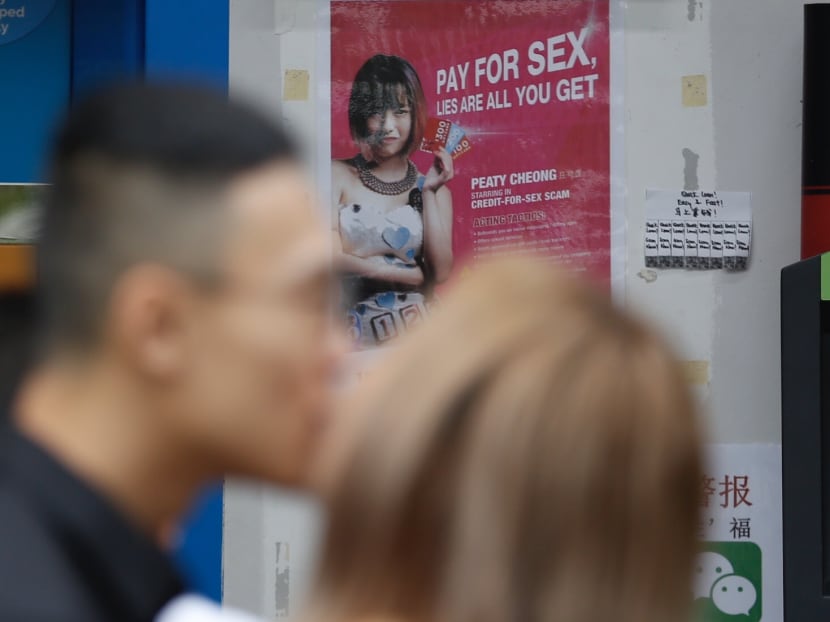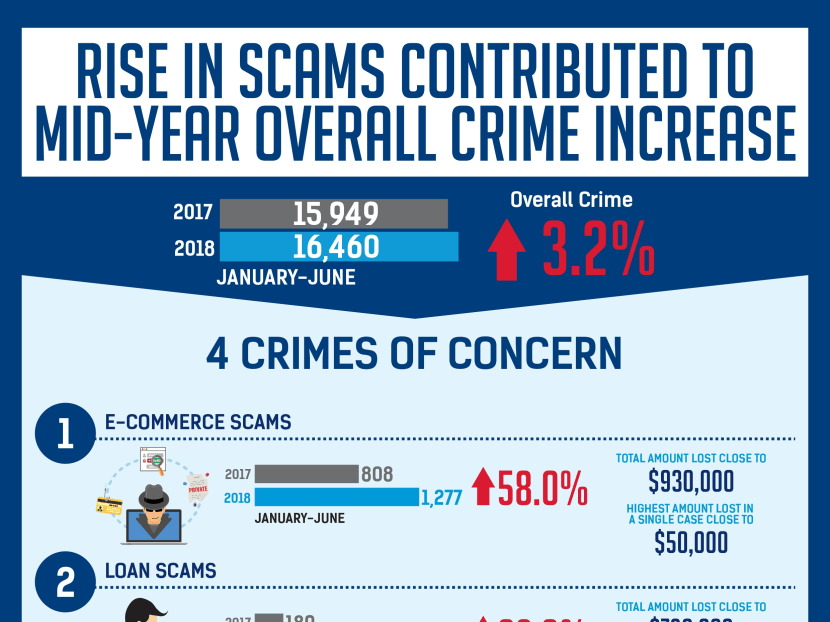E-commerce, loan and impersonation scams push up crime rate in the first half of 2018
SINGAPORE — E-commerce scams, loan scams and "China officials" impersonation scams spiked by 72 per cent in the first six months of this year — going from 1,055 cases to 1,823 year-on-year — pushing overall crime rate up.

While e-commerce scams, loan scams and "China officials" impersonation scams spiked by 72 per cent in the first six months of this year, Internet love scams decreased for the first time in five years.
SINGAPORE — E-commerce scams, loan scams and "China officials" impersonation scams spiked by 72 per cent in the first six months of this year — going from 1,055 cases to 1,823 year-on-year — pushing overall crime rate up.
Releasing its mid-year crime statistics on Thursday (Aug 23), the Singapore Police Force said the overall crime rate increased by 3.2 per cent to 16,460 cases in the first six months of 2018, from 15,949 cases in the same period last year.
Case in point: E-commerce scams on marketplace app Carousell alone went up by 136 per cent, from 432 cases in the first six months of last year, to 1,020 over the same period this year.
The police said the "pervasive" Internet penetration and greater prevalence of smartphones in Singapore likely contributed to the rise in online commercial crime cases.
"A significant proportion of online commercial crimes are committed remotely by foreign syndicates that are hiding behind the anonymity of the Internet," they added.
There was a staggering 214 per cent increase in the number of "China officials" impersonation scams, from 58 cases in the first half of last year, to 182 in the same period this year.
In these scams, the victims were tricked into transferring or handing over money to fraudsters pretending to be Chinese government officials, such as a police officer, immigration officer or court official. The perpetrators would usually con their victims into thinking that they were involved in a transnational money laundering crime, before asking them to hand over money.
The total amount cheated under such scams increased to about S$6 million in the first half of 2018, from about S$1.8 million over the same period last year.
The largest amount cheated in a single case in the first half of this year was about S$650,000.
In another high profile case, two Malaysian men were charged for their alleged involvement in a series of such impersonation scams, with the police seizing cash amounting to about S$590,000. This was the largest amount seized by the police in relation to such scams in 2018.
Besides impersonation scams, there was a significant increase in loan scams, with such cases spiking 92.6 per cent to 364 in the first half of 2018, from 189 in the same period last year.
For these, the modus operandi is scammers, who claim to work for licensed moneylenders, would send SMSes or WhatsApp messages to their victims offering loan services.
Victims who expressed interest in taking up the loan services would then be instructed to transfer a sum of money as a deposit before the loan could be disbursed. Once the "deposit" is received, the scammers would disappear with the money, with no loan disbursed.
The total amount cheated increased by 192 per cent to about S$730,000 in the first half of 2018, from about S$250,000 in the same period last year. The largest amount cheated in a single case in the first half of 2018 was about S$90,000.
More people are also getting cheated on online marketplaces. There was a 58 per cent increase in e-commerce scams to 1,277 cases in the first half of 2018, from 808 cases in the same period last year.
The bulk of these scams (80 per cent) took place on popular online marketplace app Carousell, with common transactions involving electronic items, and tickets to events and attractions, in particular, tickets to the Universal Studios Singapore.
The total amount cheated increased by roughly 43 per cent to about S$930,000 in the first half of 2018, from about S$650,000 in the same period last year.
The largest amount cheated in a single case in the first half of this year was about S$50,000.
The police advised consumers to protect themselves by making use of payment systems such as CarouPay, which releases payment to the sellers only after the buyers acknowledged the satisfactory receipt of the items purchased.

FIRST DIP IN INTERNET LOVE SCAMS
Internet love scams decreased for the first time in five years. There was an 18.6 per cent decrease to 280 cases in the first half of 2018, from 344 cases in the same period last year.
The total amount cheated also fell to around S$12 million in the first half of 2018, from about S$22 million in the same period last year.
A Transnational Commercial Crime Task Force (TCTF) was set up in October last year to investigate cases of Internet love scams specifically. Since its formation, the task force has seized more than S$1.1 million and closed more than 400 bank accounts belonging to money mules who were involved in internet love scams, "which has disrupted the operation of such syndicates", said the police.
There was also a decrease in credit-for-sex scams, with an 18.2 per cent decrease to 207 cases in the first half of 2018, from 253 cases in the same period last year.
In these scams, men pose as attractive women and befriend male victims on social media platforms such as WeChat. They then ask victims to buy online shopping credits or gift cards at AXS machines or convenience stores, promising to meet, go on a date or offer sexual services.
The scammers would then instruct the victims to send images of receipts showing codes of the credits or cards to designated email accounts so syndicates, based in various countries, can claim them.
The total amount cheated fell to about S$450,000 in the first half of 2018, from about S$720,000 in the same period last year.
National Crime Prevention Council (NCPC) Chairman Gerald Singham said Singaporeans still lose "millions of dollars" every month to scams. "In the months to come, we will roll out a revamped campaign and intensify our outreach to the community through advocates and tie-ups with corporations," he added.
Other crimes not related to scams such as outrage of modesty cases, also increased. The police saw such cases increase by 21.5 per cent from 685 cases in the first six months of last year to 832 cases in the same period this year.
The police said that they are concerned about the number of victims molested in public entertainment nightspots and on public transport — there were 63 outrage of modesty cases at nightspots and 105 such cases on public transport in the first half of 2018 alone.
"The police is closely monitoring the increase in outrage of modesty cases. We will continue to step up our efforts to work closely with stakeholders and the community to prevent and deter such cases, especially in public entertainment night spots and public transport networks," said Senior Assistant Commissioner of Police How Kwang Hwee, who is also director of Operations Department.
To that end, the police will launch a "smart clubbing" campaign later in the year, where it will partner public entertainment outlets in Clarke Quay to educate patrons about common crimes such as outrage of modesty and how to identify and report such cases.
For example, nightspots will put up "glow-in-the-dark" crime advisories as reminders for patrons to be vigilant, while management and service staff will maintain a lookout for patrons who may appear tipsy or drunk.






